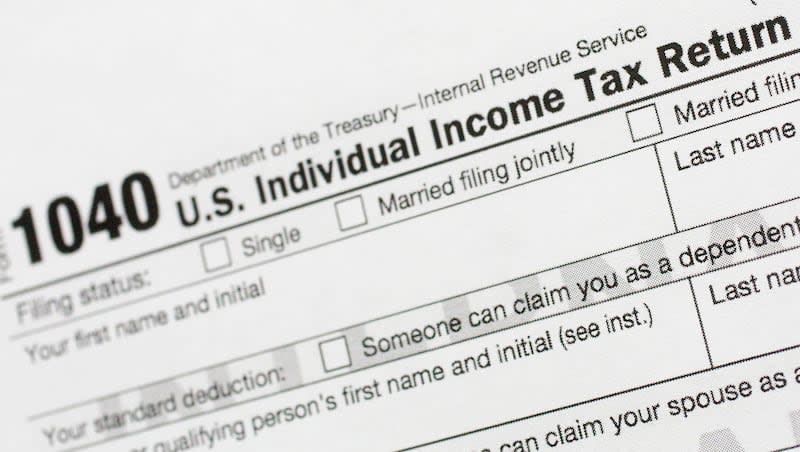Should all income tax returns be made public?

- Oops!Something went wrong.Please try again later.
Pity Malcolm E. Nichols.
A century ago, he was the collector of internal revenue in Boston, a normally quiet job. Suddenly, on the morning of Oct. 24, 1924, he was having a very bad day.
Nichols’ office was besieged in a way that would rival the bank runs of a decade later. The Boston Globe described how “hundreds after hundreds telephone, telegraph and call in person …” all demanding his time. It was the same at similar offices nationwide.
These were people “intent upon finding out who’s who among the high income taxpayers,” the newspaper said.
1924 was the year Congress reworded the revenue law to say that all names, addresses and amounts of income taxes paid by everyone who filed a return “shall as soon as practicable … be prepared and made available to public inspection …”
U.S. Treasury Secretary Andrew Mellon took that wording literally, much to the anger of the nation’s wealthiest citizens.
In Boston, Nichols told people it would take six months to go through the books and figure out who paid the most in taxes. Anyway, the information being made public wouldn’t help determine a person’s net worth, annual income, or how much he or she had in tax-exempt securities.
But elsewhere, people had a more can-do spirit. Newspapers nationwide found some interesting tidbits. For instance, John D. Rockefeller Jr. paid $7,435,169.41 in income tax that year, but banker J.P. Morgan Jr. paid only $98,643.
Hmm, the nation seemed to say in unison.
Every time I visit the dusty electronic archives to examine this strange moment in U.S. history, I’m always led to ask, could we do this again? Should we?
Before you start warming the kettle of tar and feathers, think about this for a moment. Chances are, you’re preparing returns right now, or you have recently done so. Wouldn’t it be in the nation’s interest to know how much everyone is paying?
I’ve never been anti-rich. The wealthy provide jobs that keep the nation’s economy booming. Hard work and innovation should pay off. That’s not my point.
But three years ago, the Penn Wharton Budget Model estimated $1.33 trillion in income goes underreported each year. Would transparency change that?
As a recent opinion piece by Vanessa Williamson of the Brookings Institution said, rural interests in 1924 were pushing to make tax returns public as a protection against fraud and evasion by “the northeastern industrial elite.”
She quoted Republican Nebraska Sen. Robert Howell who, at the time, said “secrecy is the greatest aid to corruption,” and “the price of liberty is not only eternal vigilance, but also publicity.”
A little sunshine is a good disinfectant.
If we did this today, Democrats could shame the rich into paying their fair share, and Republicans could have fun finding out how little some wealthy Democrats are paying.
And, of course, the absurdly complicated nature of the tax code would become painfully apparent. This might lead to greater tax compliance and a simpler code.
Also, yes, you could find out how much your neighbor is paying. In the digital age, no modern Malcolm Nichols in Boston or anywhere else could claim it would take months to compile a list of the largest taxpayers. Just press a button.
Which, admittedly, could be a problem.
As I’ve written before, this kind of transparency already exists in Norway. But the Norwegians had to pass a law requiring some reverse transparency, as well. You are notified when someone looks you up, and you are given that person’s name. This put an end to what had become known as “tax porn,” wherein an estimated 40% had been regularly using the databases as entertainment.
We already make property tax records public. It’s easy to find out the exact salaries of every public employee in Utah. Why should income tax, 1924 style, be any different? (Actual income figures were not made public, and we probably would redact addresses today.)
The answer is, probably for the same reason 1924 was just a blip in history. Back then, Wall Street erupted in indignation, calling it an “invasion of privacy” that Democrats likely would use as a campaign issue against Calvin Coolidge (he won easily).
As Williamson said in her opinion piece, 1924 marked the third, and last, time income tax records were made public.
Frankly, I don’t see it happening again. There are cultural reasons. Americans have few social rules these days, but keeping matters of income and taxes discrete is one. Also, Wall Street hasn’t changed much in 100 years.
And, as Malcolm Nichols could tell you after that bad day, there are human-nature reasons, too.

